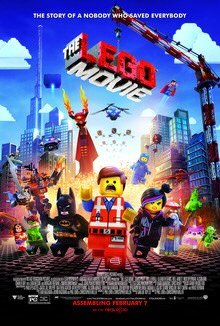Director: Phil Lord, Christopher Miller
Cast: Chris Pratt, Will Ferrell, Elizabeth Banks, Will Arnett
Have I Seen it Before: Oh, certainly. The theatrical release coincided with my most recent dip into the wild world of LEGO. I’ve taken another dip recently, partially due to the COVID-19 pandemic, and also because they have finally relented to the wishes I never even knew I had and are releasing a LEGO typewriter quite soon.
Did I Like It: It’s a pretty dumb idea for a movie, and one that has become all-too-prevalent in the movies over the last few decades. Take anything. Any property which people will automatically recognize and already has the potential for endless tie-in products. Doesn’t matter is if it has no narrative that one can find. Dust off some rudimentary Joseph Campbell. And you’ve got yourself a movie. After Star Wars - Episode IV: A New Hope (1977)—to say nothing of its sequels—and Batman (1989) it irretrievably became a governing principle of Hollywood production.
That’s not necessarily a bad thing. I like—hell, border on psychotically love—both of those films. Those films had narratives to tap into or create. The problems started when the experiment got out of the lab and anything was worthy of a feature film. You can get upset with this assessment if you like, but aside from Madeline Khan, Clue (1985) isn’t as good as you remember it. This doesn’t even cover the journeys into the inexplicable that were Ouija (2014) and Battleship (2012). Even the Pirates of the Caribbean films started off strong, but almost immediately descended into the basest forms of corporate synergy that one would have assumed they would always be.
And so, too, it could have been with The Lego Movie. But it wasn’t. Lord and Miller take their unique skills that actually made 21 Jump Street (2012) a watchable film and make a movie meant to market toys—delightful and engaging though they may be—and make it a revolutionary notion in simultaneous support of embracing the inner spark of creative anarchy and holding in high esteem the virtue of collective action.
It’s a children’s movie that should never have gotten the green light from a major studio, to say nothing of the board of directors of a toy company with shareholders to consider. Every once in a while film can harness something that surpasses the commercial necessities of producing pieces of art at such a high level.
That this worked so brilliantly—and not a little bit hilariously—almost makes the fact that they tried to make a movie out of Super Mario Bros. (1993) worth all the trouble.

